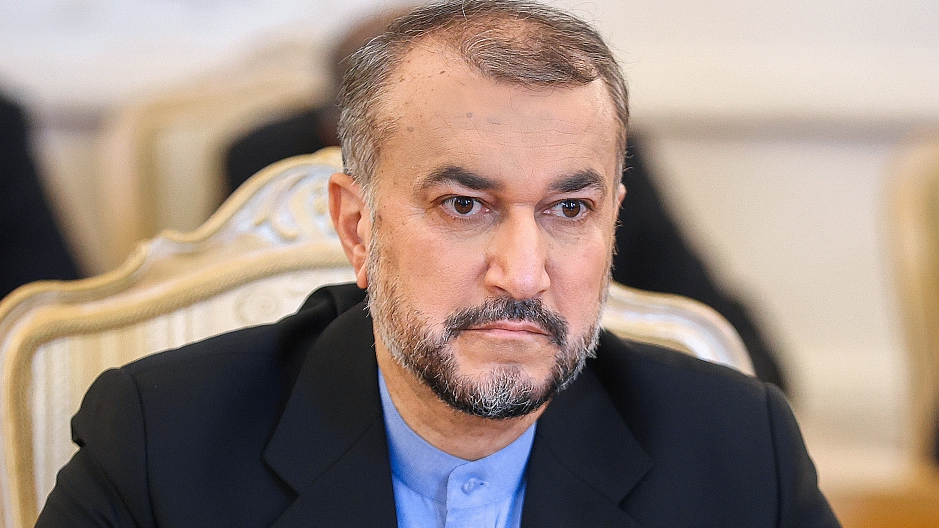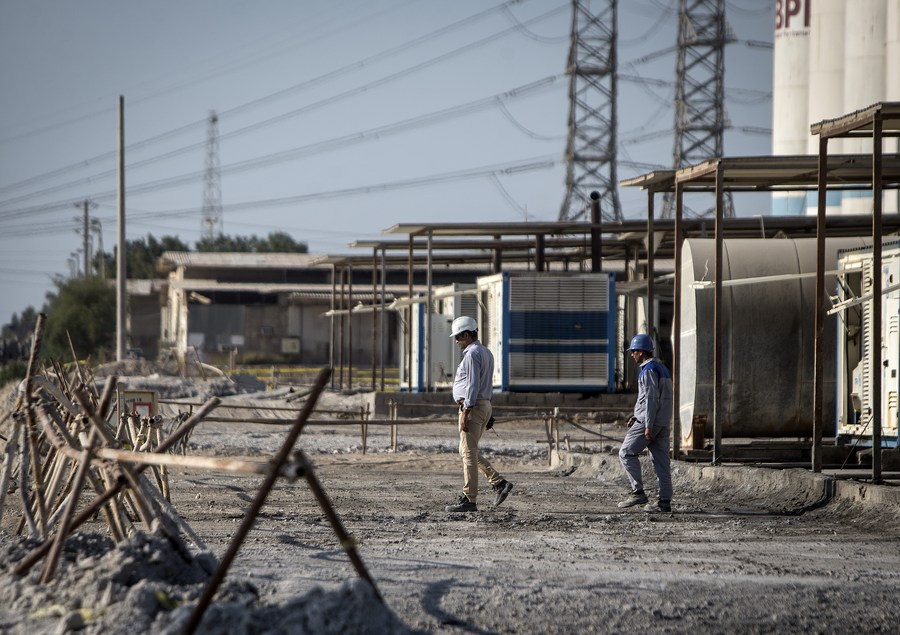
Iranian Foreign Minister Hossein Amir-Abdollahian attends a meeting with Russian Foreign Minister Sergey Lavrov in Moscow, Russia, August 31, 2022. /CFP
Iranian Foreign Minister Hossein Amir-Abdollahian attends a meeting with Russian Foreign Minister Sergey Lavrov in Moscow, Russia, August 31, 2022. /CFP
Editor's note: Nadim Siraj, author of Secret Notes from Iran: Diary of an Undercover Journalist, is an India-based journalist who writes about conflict and current affairs. The article reflects the author's opinions and not necessarily those of CGTN.
As Tehran and the Western powers are locked in tense negotiations over reviving the Iran nuclear deal, a breakthrough is on the cards, and it clearly promises to benefit the world on multiple fronts.
If the stalled 2015 deal springs back to life, crude oil prices will plunge in a major relief for oil-dependent nations; Iran's oil and gas exports will partly douse Europe's energy crisis; U.S. hegemony via petrodollar earnings will diminish; sanctions-riddled Russia will find a way to sell its blacklisted oil; and Iran will get freedom from U.S.-backed economic sanctions.
It isn't certain how soon the nuclear deal will be restored, but once it happens, Iran will get the nod to release 1-2 million barrels of crude oil into the market every day. Tehran is currently debarred from freely selling its oil to foreign buyers because of a standoff with the U.S.
A jump in the supply of Iranian oil would drive the total daily crude output of the Organization of the Petroleum Exporting Countries (OPEC) to beyond 30 million barrels. It would drastically bring down Brent crude prices from the near $100-mark to well under $80 per barrel in 2023, as analysts predict.
Respite for oil importers
A sharp drop in prices will be a huge relief for oil-importing countries such as China, India, Japan, South Korea, the UK, the EU, and many others, which buy much of their crude oil from OPEC. Dozens of governments trying to rebuild their pandemic-battered economies want the deal to be back on track, so that they can buy oil at cheaper rates in these trying times.
In fact, the ongoing energy crisis sweeping across Europe can be partially but firmly addressed if newly unlocked Iranian oil and gas is allowed to reach the continent.
The last week of August saw oil prices plunge by $6 after a UK-based TV channel reported that Tehran and Washington successfully worked out the deal's return. It is a clear indication that oil prices will head south if the agreement is jump-started.
Officially called the Joint Comprehensive Plan of Action (JCPOA), the 2015 nuclear deal was struck during the Barack Obama years, removing Western-backed economic sanctions on Tehran in exchange for limits on the country's nuclear program. The EU, the UK, U.S., China, Russia, France, and Germany are signatories to the agreement.
In 2018, the U.S.-Iran rivalry cast its shadow on the deal. The Trump administration torpedoed it at a time when Iran was the third-biggest oil producer in the OPEC after Saudi Arabia and Iraq. Angered by America's pullout, Iran ratcheted up its nuclear activity, enriching uranium to record-high levels, while U.S.-led retaliatory sanctions hammered the country's economy. The standoff continued, and as Iranian crude oil remained bottled up due to the sanctions, prices crept northwards, even roaring past $100 per barrel in recent weeks.

Workers at the construction site of the second phase of Iran's Bushehr Nuclear Power Plant in Bushehr, southern Iran, November 10, 2019. /Xinhua
Workers at the construction site of the second phase of Iran's Bushehr Nuclear Power Plant in Bushehr, southern Iran, November 10, 2019. /Xinhua
Cap on profits and U.S. power
The U.S., historically Iran's biggest tormentor, won't breathe easy if it has to re-enter the deal on Tehran's terms. Crude oil is bought and sold globally mostly in U.S. dollars as part of the petrodollar arrangement. The higher the crude oil prices, the bigger are OPEC's earnings in petrodollars. And that, in turn, translates into a stronger American currency and unchallenged U.S. hegemony in global affairs.
The revival of the Iran deal would significantly shrink petrodollar profits and weaken America's dollar-driven clout because of tumbling crude oil prices triggered by the release of locked-up Iranian oil.
Israel, too, is against the deal's revival, but for a different reason. Iran's return from the geopolitical wilderness will straightaway make it more influential in West Asia than its arch-rival Israel, a staunch U.S. ally. Recently, Israeli Prime Minister Yair Lapid discussed the Iran deal with U.S. President Joe Biden.
On the other hand, Russia, reeling under sanctions slapped by the West for its role in the Ukraine conflict, is looking forward to the deal's resurrection. A concession Tehran is expected to carve out includes buying Russian crude oil locked up due to sanctions. A planned arrangement, called "swap mechanism," will essentially let Moscow bypass U.S.-engineered sanctions on its crude oil exports. It works like this: Iran will buy Russian oil for internal consumption, and sell its own oil to other countries on behalf of Russia.
Big win for Tehran
As for Iran itself, the deal's comeback will set it free from crippling U.S.-led sanctions. Economic sanctions on close to 17 Iranian banks and more than 150 Iranian organizations are expected to be lifted. The new agreement could also include the release of $7 billion of Iranian funds reportedly locked up in South Korea.
Another key concession the Iranians are seeking from the West is the inclusion of a cause in the deal that says the U.S. must pay a hefty fine whenever it pulls out of the agreement – as it did during Trump's presidency.
The freedom from sanctions will come at the cost of Iran's cherished nuclear program, which will need to be tempered and restricted considerably. Tehran may have to reverse the progress it made in nuclear technology. But for a country hit hard by sanctions and without permission to independently sell its crude oil, getting freedom from these punitive actions perhaps outweighs the cap on its nuclear ambitions.
Rumblings around the nuclear deal – with Washington every now and then agreeing and disagreeing to Tehran's demands – have sent the OPEC+ grouping into a huddle to discuss future oil prices. The world's top oil exporters are uneasy about the idea of the revived Iran deal bringing down oil profits.
But the world is no longer as firmly dominated by monopolistic forces like the U.S. government, the U.S. dollar, and the oil industry as it used to be. We now live in a more balanced and multipolar world. Developments such as the expected resurrection of the 2015 Iran deal are an indication of this welcome transformation.
(If you want to contribute and have specific expertise, please contact us at opinions@cgtn.com. Follow @thouse_opinions on Twitter to discover the latest commentaries on CGTN Opinion Section.)

